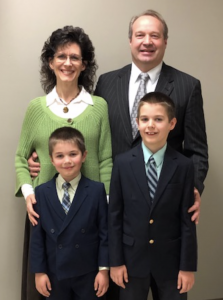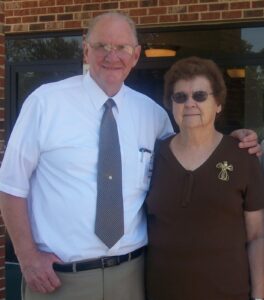By John O’Malley
Thirty years ago, my father passed away. A few months after his death, our son John, then three, said, “Dad, tell me stories about Grandpa; I think I am forgetting him.”
John’s words touched my heart. His words reminded me of Solomon, another son who wrote under inspiration. When Solomon wrote of memories, he said, “The memory of the just is blessed: But the name of the wicked shall rot.” (Proverbs 10:7)
Memories. They are precious. Memories are the thoughts we play in the theatre of our minds. Memories help us see yesterday, help us get through today, and keep our eyes fixed on tomorrow.
When we replay memories, our memories keep our dear ones near to our hearts after they’ve left us.
Rehearsing memories helps us process our grief. When we recall such memories, we remind ourselves of our goodly heritage.
The death of Pastor Wingard on March 12, 2021, brings this thought to the forefront: I do not want a generation of missionaries ever to forget the Founder of our missions agency.
At Pastor Wingard’s funeral, I shared my tribute. I will share it below.
I want to hear your tribute. I want to read your tribute. I want our tributes shared, so people will know our heritage, understand our history, and serve their generation by the will of God. (Acts 13:36)
On our website, you can post your tribute and your pictures. We want Pastor Wingard’s family to read and see your tributes. The missions office will publish these tributes in a book for Mrs. Wingard and give one to each of their children to have for their families.
Please click this link and share your testimony of memorable moments you had with Pastor Wingard. Please share any photos you have. We want these books to be special. Your tribute and photo will ensure the stories which made World Wide will not be lost because we did not tell them.
If you have any complications posting your tribute, you may email your tribute to Rebekah Tolley, and she will get it posted for you.
MY TRIBUTE:
I feel pity for a world where people will live and die without Pastor Bill Wingard’s inspiration and influence in their generation.
Today I share my memories with you. They are memories which remind me of his character, his attributes, and his noblest intentions to be like Christ.
For many of us here, we know he would blush at this attention paid him. Yet, we are here today with hearts full of memories.
My Memories:
I have four thoughts which summarize my 28-year relationship with this dear man of God. I saw him and learned:
- He Loved — flawlessly
- He Taught — biblically
- He Prayed — sincerely
- He Led — graciously.
1. He Loved — Flawlessly
We met for the first time in June of 1993. In Pastor Wingard, I met a gentle soul and a Christian gentleman. He spoke words of encouragement in my hour of need. He took our family in and loved us.
Pastor Wingard made room for us and gave us a place to belong.
My son said, “Dad, Pastor Wingard always treated me like one of his grandkids; he fully accepted me into the family.” As John’s dad, I cannot tell you how many times over these nearly three decades Pastor asked me, “How’s my little buddy,” and after John married, “and how is his wife?” Most recently, he asked’ “How is little John?”
Many times, Pastor would say to me, “Here’s some money. Take your family to get some ice cream. Take time to rest.”
He loved God’s servants.
He loved the discouraged preachers, displaced preachers, and preachers hurt by the ministry.
If you were a preacher’s kid, you knew He loved preacher’s kids.
In any given service at Calvary, you will see many reclaimed men, women, and children. Why? Because Dr. Wingard stopped like the Good Samaritan to love the broken, to lift the beaten, and to look for the bruised so he could help them.
He loved those who served him in restaurants. He would leave handwritten notes on the back of the receipt. He was careful to love the lost and leave tracts with them.
He just loved. I never saw him as perfect. I just knew I wanted to love others like him.
2. He Taught — Biblically
He taught everywhere. If you only knew the man in the pulpit, you missed his greatest teaching and preaching. He taught intentionally and unintentionally wherever he went.
Years ago, Dr. Wingard and I rode together to Virginia Beach. We were going to see a missionary who faced brain surgery. In the car, he taught me about the seasons of the ministry. I sat mesmerized as I heard a gentle teacher speak from his heart what he learned. He did not come across as bold; he was rather meek. He spoke as a fellow-student sharing what he learned.
He taught each year in our annual Family Fellowship Week. He taught with conviction. He spoke with compassion. His obvious devotion to the Lord made me say, “I want to be a better Christian.”
He taught more than his outline.
He showed more than he intended.
He committed himself to faithful men who would be able to teach others also.
He preached with fervor. I remember a Family Fellowship Week in Shelby at Faith Baptist Church, my home church, a few years ago. Dr. Wingard was fixated on Christ; he titled the message, Our Wonderful Savior. Click here to listen to the message.
He spoke of focusing on the Whom of our lives, not the what of our lives. He spoke with such compassion and conviction. We learned from him, and we loved him for it.
He taught me for 28 years as I worked with him. He advised me on how to lead in difficulty.
He listened before he spoke. He listened with empathy and compassion. He would think of all sides of a matter and speak with clarity as he gave the directive, decision, or leadership I needed.
He taught:
- In matters of moral failures, show grace.
- In matters of someone’s doctrinal compromise, show conviction. He would say of the person who changed positions, “Brother John, we settled this a long time ago; this is not who we are as a mission.”
- In matters of preference, show compassion.
- In matters of an opponent’s obstinance, show mercy and gave them a wide berth.
- In matters of battle, know which hills are worth dying on and let God fight your battles.
When I saw something and formed a definite opinion, he urged me, “Brother John, always give to another man the same liberty you reserve for yourself.”
He taught us to love God, love people, and smile. I will miss his smile.
As Kipling said, “He could talk with crowds and never lose his virtue. He could walk with kings and never lost the common touch.”
He taught everyone is worth reaching and reclaiming. He taught Bible-preaching is paramount.
He just taught. I never saw him as perfect. I just knew I wanted to teach others like him.
3. He prayed — Sincerely
I cannot tell you the number of times I watched him pray. The location did not matter. He prayed on sidewalks, elevators, on the phone, in the car, in a parking lot, in hospital rooms, his office, and the aisles of a church.
You know, if you ever mentioned a prayer request, he prayed. Right then. Right there. When he dropped to one knee or put his hand on your shoulder, you knew he had a direct connection to God. When his head bowed, he opened a portal to God, and you knew his prayer was not hindered.
He never prayed to appear pious. He was quite the opposite. He was sincere and only wanted to tell God what was on your heart.
I listened to him pray many times. I loved the simplicity and sincerity of his prayers.
He just prayed. I never saw him as perfect. I just knew I wanted to pray for others like him.
4. He led — Graciously
He led World Wide New Testament Baptist Missions. He wanted to assist churches in getting their missionaries to the field.
He led as a shepherd with oversight and love.
He led as a husband with gentleness. I preached on a Wednesday night in January 2021 and walked into church to his office with him and Mrs. Arlie. Pastor noticed Mrs. Arlie’s hair needed a little teasing out. He stopped right there and teased out her hair. I was so moved by his graciousness and love.
He led as a father and grandfather: his children, grandchildren, and great-grandchildren are a tribute to this patriarch.
Watching his leadership for almost three decades, I learned:
He led with love, grace, and mercy.
He led by exhortation and scriptural example.
He led by conviction and a godly character.
He led by principle and with purity.
He just led. I never saw him as perfect. I just knew I wanted to lead like him.
He loved, taught, prayed, and led.
In preparing this tribute, I recalled a line from Pastor Phineas Gurley’s sermon at President Abraham Lincoln’s funeral.
“He is dead; but the God in whom he trusted lives, and He can guide and strengthen his successor as He guided and strengthened him.
He is dead; but the memory of his virtues, of his wise and patriotic counsels and labors, of his calm and steady faith in God lives; these are precious, and will be a power for good.”
–Dr. Phineas Gurley of Abraham Lincoln at Lincoln’s funeral
My last time with Pastor Wingard was in February 2021. It was just his son, Billy, Brother Whetstone, Pastor Wingard, and me. Seated in his reclining chair, he asked us to wait a moment. He wanted to stand and hug us both goodbye. He spent great energy and withstood sharp pain, but he stood.
I felt in my heart, “This is as a king bowing to his subjects.” He hugged Brother Whetstone. He hugged me. He did not just hug my body, he hugged my heart.
My mother said at my father’s funeral as she walked past his casket and patted it, “I will meet you in the morning.”
Pastor Wingard, I will meet you in the morning.







